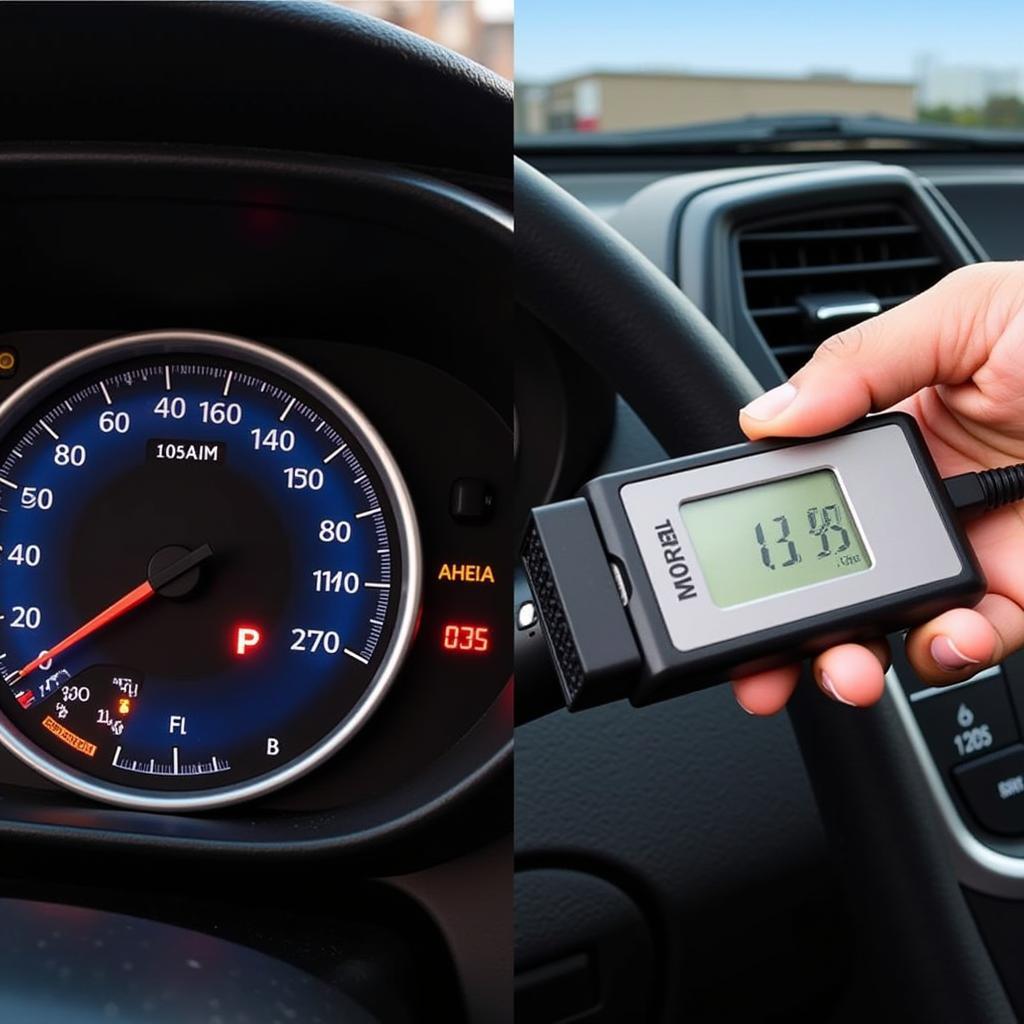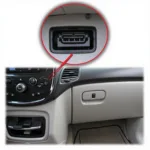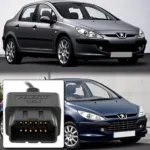The quest for the most accurate OBD2 speedometer often stems from a desire for precise speed readings beyond the capabilities of a vehicle’s built-in gauge. Whether you’re a performance enthusiast, a cautious driver, or simply want a reliable way to monitor your speed, an OBD2 speedometer can be a valuable tool. This guide delves into the world of OBD2 speedometers, helping you understand their functionality, accuracy, and factors to consider when choosing the right device.
What is an OBD2 Speedometer and How Does it Work?
An OBD2 speedometer taps into your vehicle’s onboard computer system through the OBD2 port, typically located under the dashboard. Unlike your car’s speedometer, which relies on wheel sensors that can be affected by tire pressure or wear, an OBD2 speedometer retrieves data directly from the vehicle’s ECU (Engine Control Unit). This direct access to the vehicle’s internal calculations allows for potentially more accurate speed readings.
Factors Affecting OBD2 Speedometer Accuracy
While OBD2 speedometers generally offer a high level of accuracy, several factors can influence their readings:
- Vehicle’s ECU Calibration: The accuracy of the data provided by the ECU itself can vary slightly between vehicles.
- GPS Signal Interference: Some OBD2 speedometers incorporate GPS data for enhanced accuracy. However, tunnels, tall buildings, or dense foliage can interfere with GPS signals, affecting the readings.
- OBD2 Scanner Quality: The quality and precision of the OBD2 scanner itself play a crucial role in the accuracy of the speed readings.
Choosing the Most Accurate OBD2 Speedometer
Navigating the market to find the most accurate OBD2 speedometer for your needs requires considering several key aspects:
1. Data Source: GPS vs. OBD2
OBD2 speedometers may utilize GPS data alone or combine it with data from the vehicle’s OBD2 port. While GPS-only devices can offer good accuracy, a dual-data-source model often provides more reliable readings, especially in situations where GPS signals are weak.
2. Display Options and Features
Consider the display features that matter most to you. Some devices offer simple, easy-to-read speed readings, while others provide a multi-functional display with additional data points like RPM, engine temperature, and even fault codes.
3. User Friendliness and Compatibility
Opt for a device with an intuitive interface and easy-to-understand menus. Additionally, ensure the OBD2 speedometer is compatible with your vehicle’s make, model, and year to avoid any compatibility issues.
Benefits of Using an OBD2 Speedometer
Investing in a reliable OBD2 speedometer offers several benefits:
- Precise Speed Monitoring: Obtain accurate speed readings, exceeding the accuracy of many factory-installed speedometers.
- Enhanced Safety: More precise speed awareness can promote safer driving habits.
- Performance Tracking: Monitor your vehicle’s speed and acceleration for performance analysis.
- Fuel Efficiency Monitoring: Track your speed and driving habits to optimize fuel consumption.
Most Accurate OBD2 Speedometer: Finding the Perfect Fit
While pinpointing a single “most accurate” OBD2 speedometer is challenging due to the variable factors involved, prioritizing devices with dual data sources (OBD2 and GPS), clear displays, and compatibility with your vehicle will guide you towards a reliable and accurate option. Remember, user reviews and expert recommendations can also be valuable resources in your search for the perfect device.
[best obd2 wifi|Learn More About OBD2 Wifi Options|Explore the best OBD2 scanners with WiFi capabilities for enhanced connectivity and data access.]
FAQs about OBD2 Speedometers
1. Can an OBD2 speedometer drain my car battery?
Most OBD2 speedometers have minimal power consumption and won’t drain your battery significantly. However, it’s always advisable to unplug the device when the engine is off for extended periods.
2. Are OBD2 speedometers legal?
Using an OBD2 speedometer is generally legal, as it doesn’t obstruct your view or interfere with your vehicle’s operation. However, it’s essential to check your local traffic regulations to ensure compliance.
3. Can I use an OBD2 speedometer for other vehicle data?
Yes, many OBD2 speedometers double as comprehensive diagnostic scanners. They can access and display various vehicle data, including engine RPM, coolant temperature, and even read and clear engine fault codes.
4. Do I need any technical skills to install and use an OBD2 speedometer?
Installing and using most OBD2 speedometers is relatively straightforward. They typically plug directly into your vehicle’s OBD2 port, and the on-screen menus guide you through the setup process.
5. How often do I need to calibrate an OBD2 speedometer?
Calibration requirements vary depending on the device. Some models might not require any calibration, while others might need periodic adjustments, especially if they incorporate GPS data.
Explore More OBD2 Solutions
Looking for tailored OBD2 solutions? Check out our guides on the best OBD2 options for specific applications:
[lbest obd2 with bimmercode|Best OBD2 Scanners for Bimmercode|Dive into the top OBD2 scanners that integrate seamlessly with the Bimmercode app for BMW and Mini vehicles.]
[diy car hud obd2 raspberry pi|DIY Car HUD with OBD2 and Raspberry Pi|Discover how to build your own custom car HUD using an OBD2 scanner and a Raspberry Pi for a personalized driving experience.]
Contact Us for Expert Assistance
For personalized guidance and support in finding the ideal OBD2 solutions, don’t hesitate to reach out to our dedicated team.
WhatsApp: +1(641)206-8880
Email: [email protected]
We’re available 24/7 to assist you with all your car diagnostic needs.


